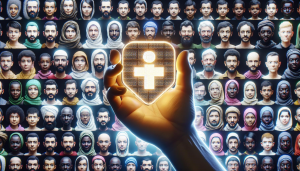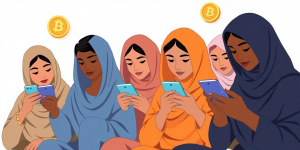The global refugee crisis is a tangled mess, and one of the biggest problems is verifying who people are. Think about it: without proper ID, refugees can’t easily get healthcare, go to school, or even get financial help. Blockchain, with its built-in security and see-through nature, sounds like a great way to give these folks a safe, digital identity. But can it really work? And what’s standing in the way?
The Identity Crisis: A Refugee’s Nightmare
Imagine this: you’ve had to run for your life, leaving everything behind. Your official papers? Gone – lost or destroyed in the chaos. That’s the reality for millions of refugees. Without proof of who they are, they’re basically invisible to the systems meant to assist them. This lack of identity leads to some serious problems:
- Can’t get essential services: Hospitals, schools, aid organizations often need proof of identity.
- Vulnerable to exploitation: Without legal recognition, refugees are easy targets for trafficking and other abuse.
- Locked out of financial services: Try opening a bank account or getting money from family without ID. Good luck.
- Resettlement roadblocks: Proving who you are is key for asylum applications and getting settled in a new country.
Blockchain: A Rock-Solid Foundation for Identity
Okay, so what is blockchain? Basically, it’s a digital record book that’s shared across many computers. This makes it super hard to mess with the data inside. Think of it like a super-secure, shared spreadsheet.

This built-in security makes blockchain perfect for handling sensitive stuff like identity.
Unlike old-school identity systems where everything’s controlled by one central authority, blockchain lets individuals control their own data.
Self-Sovereign Identity (SSI): Refugees Take Control
This is where Self-Sovereign Identity (SSI) comes in. SSI is all about giving people control over their digital identities. Instead of relying on some big company or government database, refugees can store their identity info on their own devices. This gives them serious power:
- They own their data: They decide what to share, and with whom.
- They control access: They can grant or deny access to their info whenever they want.
- It’s portable: Their identity isn’t tied to one place or organization.
- More privacy: They can prove things about themselves without revealing sensitive details, using something called zero-knowledge proofs (more on that in a sec).
Zero-Knowledge Proofs: Supercharged Privacy
Zero-knowledge proofs (ZKPs) are a mind-bending piece of tech. They let you prove something is true without revealing any of the underlying information. For example, a refugee could prove they’re over 18 without sharing their actual birthday.
Imagine needing medical help. A refugee could prove they qualify for certain aid based on their nationality, without revealing their specific origin, which might help them avoid discrimination.
Real-World Projects: Blockchain in Action
This isn’t just theory. Several organizations are already testing blockchain for refugee identity. The UNHCR (the UN Refugee Agency) is using blockchain to make refugee registration and aid distribution more efficient and secure. Other projects include:
- Building Blocks (World Food Programme): Using blockchain to give cash assistance to Syrian refugees in Jordan. Pretty cool, right?
- ID2020: A global effort to create a universal digital identity for everyone, including refugees. Ambitious, but vital.
- Pilot projects: Exploring storing biometric data on blockchain for super-secure identity checks.
The Bumps in the Road: Challenges and Risks
Okay, it’s not all sunshine and rainbows. There are definitely challenges to using blockchain for refugee identity:
- The Digital Divide: Many refugees don’t have smartphones or reliable internet. If they can’t get online, they can’t use these systems.
- Data Governance: We need clear rules about how data is collected, stored, and used, to make sure it’s done ethically and responsibly.
- Scalability: Blockchain networks can be slow and expensive, especially when dealing with a lot of people.
- Interoperability: Different blockchain platforms might not work together, making it hard to share identity info across different systems.
- Security Risks: Blockchain is secure, but there can still be weaknesses in the software and hardware used to build these systems. Hackers are always looking for an opening.
Moving Forward: Collaboration and Ethics are Key
To really make blockchain work for refugees, we need everyone to pitch in: governments, charities, tech companies, and, most importantly, the refugees themselves. We need to think about:
- Digital literacy programs: Making sure refugees have the skills to use these tools.
- Open-source platforms: Creating systems that anyone can use and improve.
- Clear data governance: Protecting refugees’ privacy and rights.
- User-centered design: Making these systems easy to use and tailored to refugees’ specific needs.
- Ethical considerations: Addressing any potential risks to data security, privacy, and the potential for misuse.
Ultimately, the success of blockchain for refugee identity depends on creating systems that are inclusive, ethical, and sustainable. We have to remember that technology is just a tool.
FAQ
What’s blockchain, in plain English?
It’s a shared, unchangeable digital record book that’s known for being secure and transparent.
What’s Self-Sovereign Identity (SSI)?
It’s about giving individuals control over their own digital identities, so they decide what info to share.
How can blockchain help refugees specifically?
It can give them secure, verifiable digital identities, making it easier to access services and assert their rights.
What are the downsides of using blockchain for this?
Things like the digital divide, data governance issues, and scalability problems.
What’s the deal with zero-knowledge proofs?
They let refugees prove things about themselves without revealing sensitive info.
Who needs to be involved in making this happen?
Governments, NGOs, tech companies, and, most importantly, refugees themselves.
The real power of blockchain isn’t just the tech, it’s the potential to give marginalized people back their dignity and control. If we focus on people and tackle the challenges head-on, we can unlock the transformative power of blockchain and build a more just future for refugees.



